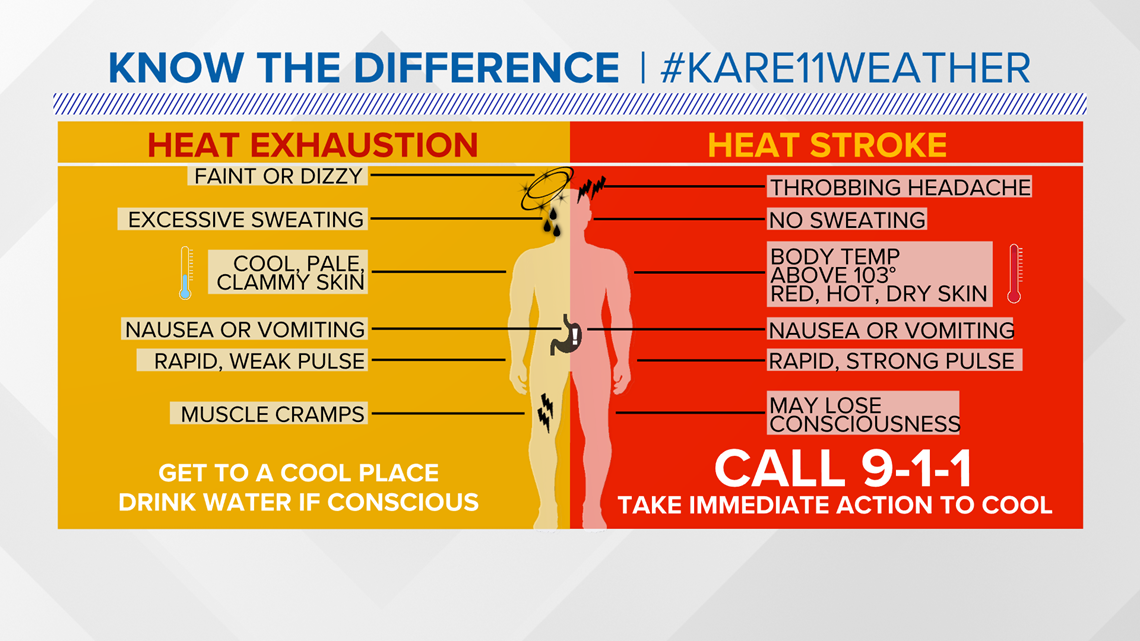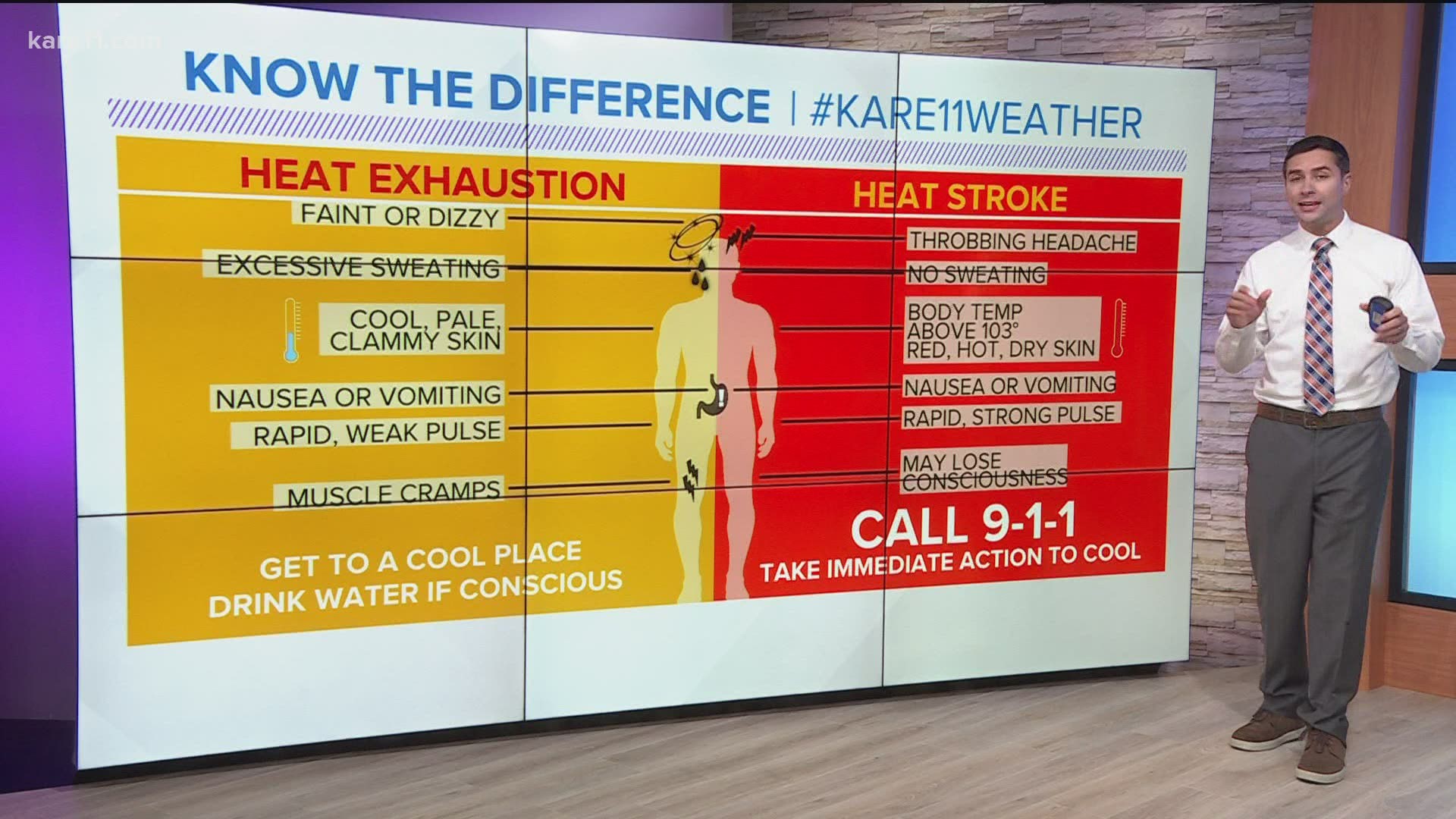MINNESOTA, USA — Summer has finally reached Minnesota, along with increased chances for high temperatures and excessive heat.
If you have to be outside during the hottest times of the day (especially if there's an heat warning in place) you could be at risk for heat-related illness. Here's how to tell whether you're experiencing heat cramps, heat exhaustion or potentially-deadly heatstroke.
RELATED: With excessive heat in the forecast, here's where you can find cooling centers in the metro
Heat cramps
The Mayo Clinic says these "painful, involuntary muscle spasms" are the mildest of the three excessive heat syndromes. They usually happen when you're exercising heavily in hot weather. Heat cramps could last longer and feel worse than standard leg cramps. They can happen in any muscle group, but are most likely in your calves, arms, abs or back.
Here's what the Mayo Clinic says you can do about them:
- Rest and cool off
- Top off your electrolytes with clear juice or a sports drink
- Do some gentle stretches and massage the cramping muscles
- Don't get back to exercising as soon as the cramps are gone; you should take a break for several hours or longer
If the cramps aren't gone within about an hour, call your doctor. The CDC says you should get immediate medical help if you're on a low-sodium diet or have heart problems.
According to the Mayo Clinic, this syndrome is less severe than heatstroke - but left untreated, it can become heatstroke. Here are the symptoms the Mayo Clinic says you should watch out for:
- Cool, moist skin with goose bumps while you're in the heat
- Heavy sweating
- Faintness
- Dizziness
- Fatigue
- Weak, rapid pulse
- Low blood pressure when you stand
- Muscle cramps
- Nausea
- Headache
Here's what the CDC says you should do when you suspect heat exhaustion:
- Move to a cool place
- Loosen your clothes
- Put cool, wet cloths on your body or take a cool bath
- Sip cool water
But if you're throwing up, your symptoms get worse, or your symptoms last longer than an hour, the CDC says you should get medical help right away.
This is the most serious type of heat syndrome. The CDC says it happens when your core body temperature reaches 103 degrees or higher, and it requires emergency treatment.
Left untreated, it can damage your brain, heart, kidneys and muscles. It can even lead to death. Here are the symptoms the Mayo Clinic says you may experience if you have heatstroke:
- Your body temperature is high.
- Your mental state or behavior is altered. This could include confusion, slurred speech, delirium, seizures or coma.
- Your sweating is different. If hot weather caused the heatstroke, your skin will feel hot and dry. If strenuous exercise was the cause, your skin could feel either dry or slightly moist.
- You feel sick to your stomach or you're throwing up.
- Your skin is red or flushed.
- Your breathing is rapid and shallow.
- Your heart is racing. The Mayo Clinic says this happens because your heart is working overtime to cool you down.
- You may have a throbbing headache.
If you think someone has heatstroke, call 911 immediately. In the meantime, the Mayo Clinic says you should get that person into the shade or indoors, remove their excess clothing and cool them by whatever methods are available.
The Mayo Clinic's cooling advice includes putting the person in a cold bath or shower, spraying them with a garden hose, sponging them with cool water, fanning them while misting them with cool water, or placing ice packs or cold wet towels on their body.


Risk factors
All three of these diagnoses can be brought on by hot weather and intense exercise. The Mayo Clinic says other factors can play a part in serious heat complications as well.
- Excess clothing that keeps sweat from evaporating easily
- Drinking alcohol; it affects your body's ability to regulate your temperature
- Being dehydrated, like if you don't drink enough water to replace your sweat
- Age; young children haven't fully developed their central nervous system. Adults over 65 have central nervous systems that don't cope with heat as well
- Being exposed to a sudden increase in temperature, like if there's a heat wave or you travel to a hotter climate
- Some medications that affect your body's ability to stay hydrated and cool. Be careful if you take meds that narrow your blood vessels, block adrenaline to regulate your blood pressure, rid your body of sodium and water (diuretics) or help with mental symptoms (antidepressants or antipsychotics). Stimulants for ADHD, or illegal stimulants like amphetamines or cocaine, can also be a risk factor.
- Some health conditions, including heart or lung disease.

